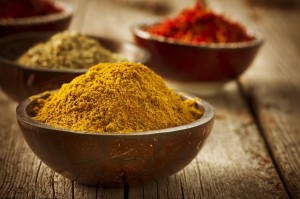By Sayer Ji
Contributing writer for Wake Up World
Your spice rack may contain the safest, most fast-acting, brain-boosting substance medical science has yet to confirm effective in a human clinical study.
A remarkable study published in the Journal of Psychopharmacology titled, “Investigation of the effects of solid lipid curcumin on cognition and mood in a healthy older population,” reveals that the primary golden-hued polyphenol found in the ancient Indian healing spice turmeric known as curcumin is capable of improving cognition and mood in elderly adults (60-85) when administered in either short-term [acute], chronic, or short-term-on-chronic dosage schedules.
The study involving 60 healthy adults found that a single dose of 400 mg of a solid curcumin formulation (trade name Longvida) resulted only one hour later in significantly improved performance on sustained attention and working memory tasks, compared with placebo.
[pro_ad_display_adzone id=”110028″]
Additionally, a chronic treatment schedule (4 weeks) resulted in improvement in working memory and mood, the latter of which was defined as a positive change in their “state [of] calmness, contentedness and fatigue induced by psychological stress.”
Finally, an acute-on-chronic treatment resulted in improved alertness and contentedness.
The authors commented that,
“To our knowledge this is the first study to examine the effects of curcumin on cognition and mood in a healthy older population or to examine any acute behavioral effects in humans. Results highlight the need for further investigation of the potential psychological and cognitive benefits of curcumin in an older population.”
The study reviewed several therapeutic properties of curcumin that may have relevance in improving underlying physiology associated with age-related cognitive decline and may help to explain its observed brain-boosting effects include:
- Curcumin may inhibit amyloid pathology (a type of degenerative brain plaque found in Alzheimer’s disease)
- Protect against oxidative stress
- Reduce inflammation
- Neuroprotective, promoting neurogenesis and neuroplasticity
- Improve the functioning of neurotrasmitter systems
The study also pointed out that epidemiological evidence shows dietary curcumin consumption is associated with better cognitive function and lower dementia prevalence, and that animal research has demonstrated its ability to both and prevent neurological pathologies.
The reality is the positive results described in this study is not be surprising given all the research that exists on curcumin’s neuroprotective properties. The Greenmedinfo database has indexed over 1500 study abstracts on curcumin’s health benefits, covering over 600 different diseases, with 113 of these studies specifically addressing curcumin’s neuroprotective properties.
Consider also that recently a Groundbreaking Study Found Turmeric Extract Superior to Prozac for Depression, revealing again how remarkable curcumin is at improving mood and a sense of well-being.
We have also explored in depth a promising case study which found that turmeric produced a ‘remarkable recovery’ in Alzheimer’s disease patients, and performed a review of turmeric and other natural substances’ role in preventing and even reversing Alzheimer’s disease.
As evidenced by the study featured here, the medical community is increasingly being faced with compelling research suggesting that natural compounds and foods like turmeric provide suitable alternatives to pharmaceuticals. Increasingly, the public is learning to take back control of their health by utilizing time-tested, food-based approaches that have been part of ancestral cultural practices for thousands of year. Why not look for preventive and truly regenerative solutions in the spice rack, and leave the medicine cabinet for acute care?
Related reading:
- How WHOLE Turmeric Heals the Damaged Brain
- How Turmeric Can Save the Aging Brain From Dementia and Premature Death
- Brain Regeneration: Why It’s Real and How To Do It
Recommended articles by Sayer Ji:
- The Powerful Aspirin Alternative Your Doctor Never Told You About
- 13 Evidence-Based Medicinal Properties of Coconut Oil
- Group Drumming Better Than Prozac, Study Suggests
- 25 Cancer Stem-Cell Killing Foods That Are Smarter Than Chemo and Radiation
- Ibuprofen Can Stop Your Heart – 31% Increase in Cardiac Arrest Risk
- How Pomegranate Puts Chemo and Radiation to Shame
- Dramatic Recovery in Parkinson’s Patient with Gluten Free Diet
About the author:

Sayer Ji is the founder of Greenmedinfo.com, a reviewer at the International Journal of Human Nutrition and Functional Medicine, Co-founder and CEO of Systome Biomed, Vice Chairman of the Board of the National Health Federation, and Steering Committee Member of the Global Non-GMO Foundation.
For more, visit GreenMedInfo.com and Facebook.com/GreenMedInfo, or sign up for GreenMedInfo’s free e-Newsletter.
© October 23rd, 2014 GreenMedInfo LLC. This work is reproduced and distributed with the permission of GreenMedInfo LLC. Want to learn more from GreenMedInfo? Sign up for their newsletter here.
[pro_ad_display_adzone id=”110027″]







